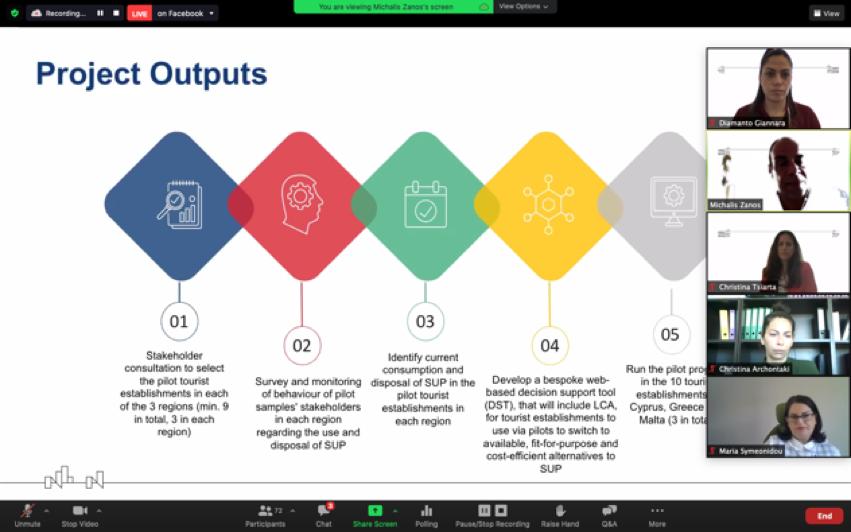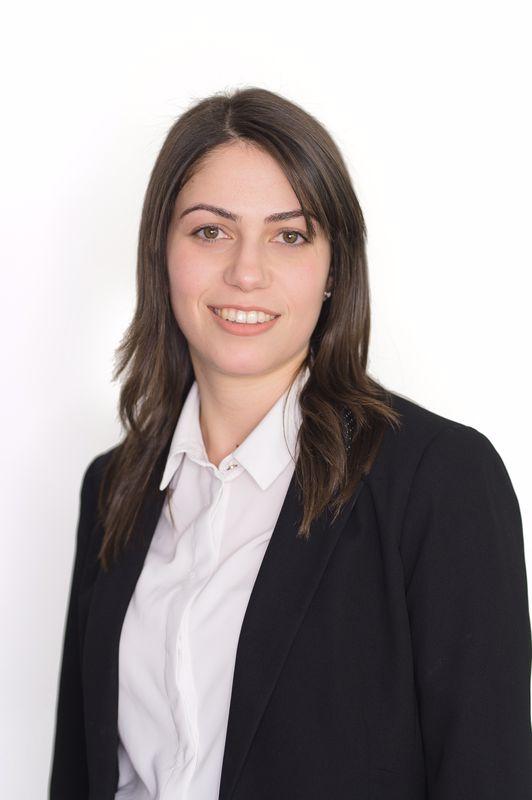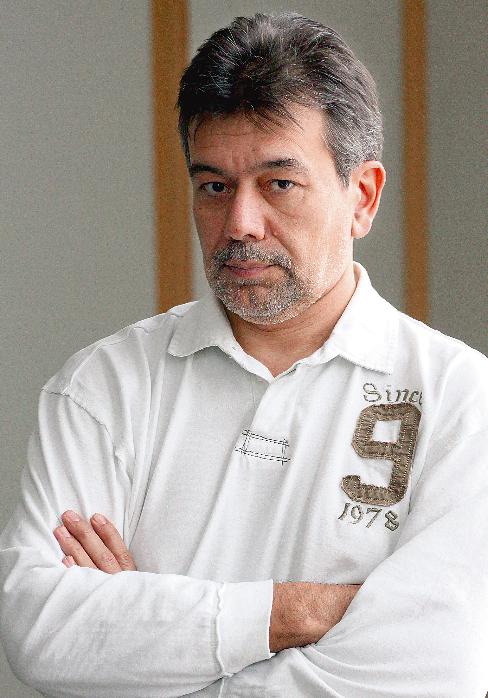
3 minute read
The Launch Event of the project SUPMed has been successfully implemented
On Thursday April 8 July 2021, the launch event of the project titled “Reducing the Consumption and Disposal of Single-use Plastics in the Tourism Industry in Cyprus, Greece and Malta”, also known as “SUPMed”, was held. In the event, several stakeholders participated such as general and waste managers of tourist establishments, representatives from local and national public authorities, members of research institutions and universities in the three regions.
During the event, the participants had the chance to hear more about the problems that the tourism industry is facing due to the usage of Single-use Plastics (SUP), the EU’s agenda on the reduction and replacement of SUP, the project’s expected outputs and outcomes and the role of each partner in the project. Also, the participants had the chance to learn more about the EEA and Norway Grants from representatives of the Fund Operator. Due to Covid-19 restrictions, the Launch Event was held digitally via Zoom. All the presentations of the Launch Event will be posted to the project website.
Advertisement
The SUPMed project runs until June 2023 with a total budget of €1,279,405.00. The six project partners participating in the project are Aspon Consulting Ltd as the Lead Partner (CY), Heraklion Chamber of Commerce and Industry (GR), Anelixis Development Consultants S.A. (GR), Cellock Ltd (CY), AIS Environment (MT) and the Cyprus Hotel Association (CY).
The project consortium aims to reduce the consumption, disposal and impacts of SUP in the tourism sector in these three regions, in line with EU Directive 2019/904 on the reduction of the impacts of plastic products. Through this project, the partners will support samples of coastal tourist establishments in Cyprus, Malta and Greece (Crete) via pilots to move to sustainable resource-efficient business models. The establishments will identify and replace commonly-used SUP with environmentally friendlier, readily available and affordable alternatives. The pilot samples will be supported in phasing out and replacing SUP via a bespoke free web-based decision-support tool (DST) that will be developed. The DST will present viable and available alternatives to the most commonly used SUP, taking into consideration the cost and environmental impacts of each alternative across its life-cycle.

Following the completion of the pilot in each of the three regions, best practise guides will be developed that will present the findings of the pilots, the impacts of plastic waste on human health and the environment, how to reduce SUP in the tourism and other sectors and what envirionmentally friendlier and affordable alternatives are available. These guides will be disseminated to SMEs, NGOs, tourist establishments and other relevant stakeholders in the three regions and across Europe, as an additional support tool in replacing SUPs.

Facebook: https://www.facebook.com/SUPMedProject
Twitter: https://twitter.com/SupmedP
LinkedIn: https://www.linkedin.com/in/supmed-project-b47b40203/

Website: https://www.supmed.eu/index.php?lang=en

Culture, Civil Society, Good Governance and Fundamental Rights and Freedoms
Project 0650
Co-Deciding Europe: Civic Tech for Good Governance and Active Citizenship! (CODE Europe)


Co-Deciding Europe: Civic Tech for Good Governance and Active
Citizenship! (CODE Europe) is developing and testing in real life an innovative model for citizen engagement in public policy decision-making based on enhanced tools for e-participation and digital democracy.
Partners in seven countries – beneficiaries of the Fund for Regional Cooperation - Bulgaria, Estonia, Greece, Hungary, Latvia, Portugal and Slovenia – are working in cooperation with organizations with leading expertise in participatory and digital democracy – the Citizens Foundation of Iceland and the European Citizen Action Service, on the development of a crowdsourcing model to solicit the ‘wisdom of the crowd’ and feed it into policy decision making on regional, national and EU level. Crowdsourcing of policy decisions will be carried out in five selected locations in the region on the topic of air quality. The expertise on the environmental aspects of the crowdsourcing politos is provided by the European Environmental Bureau.
The consortium is developing a universally applicable E-Participation Assessment Framework to allow objective comparison of the results of the crowdsourcing pilots. Alongside the crowdsourcing pilots the project will test a ’social listening’ method using advanced information technologies to monitor citizens’ opinions on air quality, allowing researchers and policy makers to benefit from an analysis of big data, while protecting individual privacy and safeguarding citizens against inappropriate access and use of personal data.
The project contributes to the development of a new deliberativecollaborative model using the advantages of information technologies emerging worldwide which include crowdsourcing of legislation. This method has the potential to help create a more engaged and active citizenship and improved good governance by enhancing the participation of a large number of digitally-savvy citizens not typically engaged in public policy deliberations. By engaging digital platforms reaching beyond the usual stakeholders, the project encourages innovative ideas and ‘hidden’ expertise to participate in the public debate; and last but not least, helps bridge the generational and digital divide and increase the legitimacy of policy-making.
The evaluated results of the crowdsourcing pilots will be used to provide policy makers with recommendations on how to improve digital democracy in Europe; and the citizens’ contributions on ‘air quality’ through the crowdsourcing and the ‘social listening’ experiments will feed into and impact policy-making on national and on EU level.

The project’s consortium is led by the Centre for Social Sciences of the Hungarian Academy of Sciences and includes as beneficiary partners the Foundation of Public Participation, Latvia, the e-Governance Academy Foundation, Estonia, the Centre for Public Policy PROVIDUS, Latvia, the Institute for Electronic Participation, Slovenia, "Science for You" NPC –SciFY, Greece, ProInfo Foundation, Bulgaria, the OneSource Consultoria Informática Lda, Portugal and Dimos Athinaion Epicheirisi Michanografisis
(DAEM S.A.), Greece. The European Citizen Action Service, the European Environmental Bureau and the Citizens Foundation Iceland are the Consortium’s expertise partners.


Innovation, Research, Education and Competitiveness






